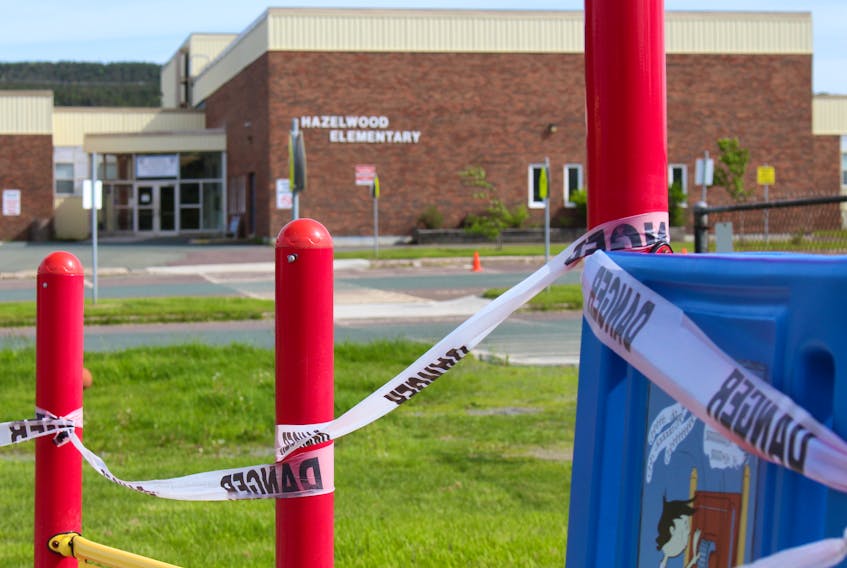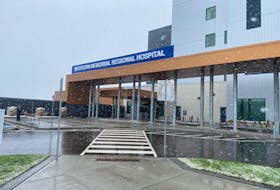ST. JOHN'S, N.L. — Some teachers in the Newfoundland and Labrador English School District (NLESD) say they are frustrated and concerned with the lack of training for teachers on how to deliver online education.
“They’re spinning wheels. They’re not focused on the problem,” said Teacher 1, who was granted anonymity in fear of repercussions for speaking out.
Come September, the teacher says, if the COVID-19 pandemic keeps the doors of the schools closed, teachers will not be prepared to teach classes online.
“(Teachers) had one day of training on Google Meet and Google Classroom,” Teacher 1 said, adding that no actual teaching happens on these platforms.
“Google Classroom is just a place (where) teachers make comments and go in and post notes,” Teacher 1 said. “There’s no actual (teaching) going on, it’s just a platform to communicate with the students.”
Teacher 1 says teachers are wondering why the NLESD doesn’t avail of an expertise in online teaching that’s right under its nose to help properly train teachers. The Centre for Distance Learning and Innovation (CDLI), which develops and delivers distance education programs to rural, isolated and remote regions of the province, has existed since 2001 and is part of the NLESD.
Teachers need to not only know the technology, but obtain the skills and strategies needed to effectively engage with students in an online classroom, and keep them interested, and it is widely known in the system how valuable CDLI is in the province, Teacher 1 said.
“When (people) want to know how to do distance (education), they come to Newfoundland and Labrador,” Teacher 1 said. “The CDLI has been doing it for years because it’s a necessity here.”
It is the understanding of many teachers, Teacher 1 said, that the CDLI hasn’t been involved in the plan to help train teachers for the possibility that come September, if a second wave of COVID-19 hits the province, schools will be shut down again.
No input
Another teacher, who also asked for anonymity for the same reason as Teacher 1, said teachers and students have been left out of the discussion.
“Our best leaders are in the classroom,” Teacher 2 said. “Get the teachers involved in the process. It took the teachers right out of the equation. Right away you could see teachers right across the province throw up their hands.”
The lack of communication has been frustrating, Teacher 2 said, because the only updates teachers, parents and students get are from the COVID-19 briefings and the media.
“We have no idea, as a group of teachers, what is going to face us in September,” Teacher 2 said.
Both teachers say the NLESD and the Department of Education and Early Childhood Development had since March to prepare a plan that should have been shared long before teachers finish up for the summer on June 25.
Tony Stack, CEO with the NLESD, said the CDLI operates for rural regions where enrolments are low and teachers are not available. It is used, generally, for high school students.
“Students would access the technology and they would participate at school, so you need high-end devices at school with guaranteed bandwidth,” Stack said.
He says it would be difficult to have CDLI programs run normally in the event the NLESD had to close schools for any reason, such as if a second wave of COVID-19 happens.
Dean Ingram, president of the Newfoundland and Labrador Teachers' Association (NLTA), says the issue of bandwidth is a problem in some areas of the province.
“(This) speaks to the need to update the infrastructure right across the province,” he said.
However, a virtual classroom used by CDLI, called Blackboard Collaborate, was specifically designed for lower bandwidth environments, Ingram says.
But he said he has not seen the data on how the Google programs compare with it.
Ingram also said the online teaching environment is a very different dynamic that requires training in both the technology and pedagogy.
“Moving to an online teaching environment is not a matter of throwing a switch,” he said. “There’s approximately 50 educators (with CDLI) in this province who have direct experience and expertise doing that. … I think it would be a prudent move to take advantage of that expertise.”
Ingram says a meeting with Chief Medical Officer of Health Dr. Janice Fitzgerald has been requested. One of the things that needs to be determined is how the government will assist the school system in implementing physical distancing measures he said.

Coronavirus concerns
Rebekah Robbins’ family has an immunocompromised person living in their house. She says her son, Leo, worries about the possibility of transmission of the coronavirus when he goes back to school.
“We’re certainly concerned about the well-being of our family,” Robbins said. “We know how difficult it is to maintain social distancing with kids of all ages.”
With regard to the curriculum and how it will be delivered, she said she acknowledges the challenges of the decision that has to be made, but it will be a balancing act figuring out how to get her son to meet the school requirements while still minimizing the risk of COVID-19.
In a news release issued on June 12, Goronwy Price, chair of the board of trustees for the NLESD, said that while the ultimate goal is to have K-12 students back in classrooms with their teachers in September, “We cannot predict with certainty how the COVID-19 health emergency will evolve over the next couple of months.”
The Department of Education and Early Childhood Development declined an interview, but stated it is working on a plan for September.
Earlier this week, Education Minister Brian Warr said the same, that the government intends to have all students physically back in school in September.
“We want to make sure that we have a plan. If part of it has to be done virtually, we’ll have a plan in place,” Warr told the media. “We’re going to have the resources in place. We want to be able to provide the best educational outcomes that we expect, the best educational outcomes that we possibly can proceed with.”
Warr said the intention is to have a plan by the end of June.
Progressive Conservative education critic Craig Pardy said the fact there’s no plan already in place is troubling.
New Democratic Party education critic Jim Dinn raised concerns about equitable access to the internet.
@AndrewLWaterman









